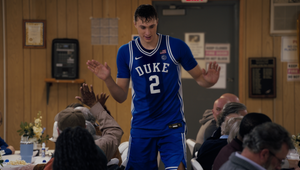
The Fall of the Ivory Tower and the Rise of Digital Higher Ed?

Higher education in the US is facing its day of reckoning. It’s been coming for a long time. Potential students have seen how rising tuition costs have saddled young adults with crippling student debt. They’re questioning the value of a degree and driving a steady eight-year decline in enrolment in degree-granting institutions (with four-year, for-profit institutions being the hardest hit).
Given these prohibitive costs, it’s no surprise that Massive Open Online Courses (or MOOCs) have grown in popularity. Originally, universities experimented with MOOCs as a way of disrupting the traditional model of higher education. They partnered with companies like Coursera, Udacity, and edX to make parts of their curriculum available online, either as programs, or as a la carte courses.
The experiment succeeded in thrusting an uncomfortable question into the foreground: if you can take Harvard courses for free or at a very low cost, why pay heaps of money for something taught by a less illustrious scholar at a less prestigious school?
Nonetheless, the early promise of MOOCs faded when the numbers came in - low engagement and sub-par course completion rates. Students grappled with screen fatigue and the self-motivation required to power through the content on their own.
We could look at MOOCs as a harbinger of the challenges that both students and schools are facing today. The pandemic has forced most learning to take place online, and students and faculty at traditional universities are realising that online schooling is as much about the delivery of educational content - and the digital student experience overall - as the subject matter itself.
One group, however, has a head start.
“This is a challenge we have definitely faced and continue to address,” says Steve Gross, chief marketing officer of the University of Phoenix, a for-profit University founded in 1976 and headquartered in Arizona - and a client of my agency, Critical Mass. “The students we serve are time-starved adults who need to acquire specific knowledge and credentials to move forward in their careers. Our mission is to make sure that they not only have access to the educational opportunities they need, but to provide it in a digital medium that fits their life and enables them to absorb the content.”
As such, schools like the University of Phoenix are suddenly competing on a more level playing field in a post-pandemic world. And it goes far beyond curriculum. “Getting the actual learning process right isn’t just a matter of recording a lecture and hosting it on a website,” says Mr. Gross. “You’re providing an entire student experience virtually. That’s a heavy lift strategically, technologically, organisationally, educationally, and experientially.”
Envision the Next Student Experience
Without a doubt, what separates traditional and online colleges (under normal circumstances) is the student experience - culture and spirit, community, access to faculty and alumni, career services, and ancillary learning opportunities. Now, these things are inaccessible, offered in a reduced form, or bogged down necessary but nevertheless limiting health precautions.
As a result, students (and parents of students) who have invested in an in-person college experience are wondering what, exactly, they’re paying for.
Michelle Ober, a fellow Critical Mass employee who is pursuing her MBA part-time at New York University, has decided that the remote experience misses the whole point. As such, she decided to defer her enrollment for the semester. In her words, “I’m paying a premium to go to NYU and have the opportunity to network with professors and peers who are the best and brightest and are a huge draw to this program.” While digital distance makes such networking more difficult, other more immersive benefits feel very different in a digital medium, such as “opportunities through Stern to participate in things like consulting projects, or the renowned DBI (Doing Business In) program that provides study and hands-on business experience abroad. Not getting the same type of access to those experiences while still paying that premium is difficult for me to justify.”
While students grapple with questions about value, universities are finding themselves at a crossroads. How much should they invest in digitising the holistic student experience? Will it all go to waste when things go back to ‘normal’? What changes in learning are we seeing in the current environment that might become permanent fixtures of higher education in the future?
Here’s my take: it depends on the school. Ivy league schools, for example, will be able to lean on their reputations and accolades. They’ll weather the current storm, and they’ll (probably) always have people knocking on their door.
But the rest will have to make their case.
For the near-term, many schools will live and die by their digital experience. They’ll have to take a close look at the parts of their experience that are the most differentiated relative to their competition (which increasingly includes online colleges, MOOCs, and trade schools). Next, they’ll have to make it easy for students to access those experiences through digital channels. They’ll also have to do it in a way that feels consistent with and supportive of their ‘brand’. And they’ll have to continue to manage and optimise these experiences as society and education moves toward the next ‘normal’.
In the meantime, online colleges such as the University of Phoenix, Capella, and DeVry find themselves with a small window of advantage. They have, for the most part, figured out the basics of delivering educational content in an online format-lectures, assignments, tests, discussion groups. The table stakes of future learning. To that end, online colleges should take advantage of their head start by creating a branded experience around everything else - the intangible necessities of the student experience. As Mr. Gross puts it: “Everything we do is focused on the people that matter most - our students. We want them to have better outcomes, a better experience, and more value. And we’re getting there through an end-to-end vision for our digital student experience, and a roadmap for achieving it.”
So, what does the future look like for higher-ed? That’s up to the institutions themselves. But the successful ones will have embraced the following:
An end-to-end brand system: Successful schools will bring their ‘brand’ into every part of the student experience, from the moment student’s first discover the school to the moment they complete a program and beyond. The schools that pull away from the pack here will be the ones who make their unique mark on the whole experience, in a way that only they can.
Exclusive offerings: This is a bit of a countertrend to the democratisation of higher education content in the digital era, but one that will help schools differentiate themselves in the online arena. In March, just as Covid was just starting to make its presence felt in the US, Yale University made a splash by offering its most popular course, The Science of Well-Being, online for free. Not only was the subject matter timely, just as Americans were beginning to isolate themselves at home, but it also showcased proprietary academic content unique to Yale.
Digitised community: In the digital agency world, we often bristle when our clients say they want to create a digital community to connect their users to one another. Who really wants to connect with other customers for anything other than ratings and reviews? The answer is almost no one. Unless we’re talking about education! Why? Making connections can make or break the educational experience. Being able to easily schedule time with a professor, participate in clubs and councils, organise and promote (virtual) events, and attend recruiting events are all things that students took for granted in pre-pandemic times. Fostering connections through digital access will be critical to delivering the value students expect.
Charlotte Diaz is VP, strategy at Critical Mass















